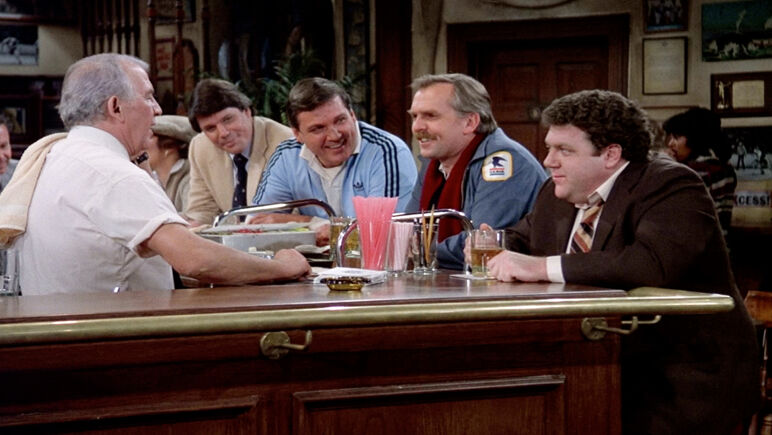

From one-episode guest stars to series leads, gay and bi characters have been coming out on sitcoms for more than five decades. These shows demonstrate that LGBTQ+ stories don’t have to be all gritty or dramatic: they can be packed in among the jokes in a half-hour comedy, and still reflect queer life as it was and is.
M*A*S*H, 1974
How about we take this to the next level?
Subscribe to our newsletter for a refreshing cocktail (or mocktail) of LGBTQ+ entertainment and pop culture, served up with a side of eye-candy.


For a show made in the 70s and set in the 50s, gays serving in the military was a bold issue to tackle. But in MASH’s season two episode “George,” a young soldier attacked by his own unit for being gay brought the debate to camp. Rumours spread quickly despite George never saying the words explicitly as he told Hawkeye what happened, and perhaps surprisingly for the time, Hawkeye and several other characters were steadfast allies. They eventually convinced the bigoted Frank not to get Weston dishonorably discharged. When “George” aired, gay activists were fighting against unjust firings, but for the military, it took until 1994’s “Don’t Ask, Don’t Tell” policy for gay and bisexual soldiers to legally serve (so long as they stayed in the closet while serving).
Related*

Cheers, 1983


The coming out of former LA Dodgers player Glenn Burke in 1982 inspired a first-season episode of Cheers titled “The Boys in the Bar,” which saw Sam host a press conference for an old baseball teammate who unexpectedly came out as gay. After initially reacting badly, Sam quickly got over his shock and publicly accepted his friend. The regulars, especially Norm, worried Cheers would become a gay bar after this press coverage, but Sam, while torn, ultimately stood by his support for his friend. By the end of the episode, Norm and the regulars had learned to be less prejudiced. Sam and Diane’s allyship and willingness to stand up to homophobia in this episode earned praise from GLAAD and from critics that ultimately helped the then-struggling show stay on the air.
Roseanne, 1992
While Roseanne Barr’s legacy is undeniably in tatters, to put it mildly, the show Roseanne was progressive for its time and was the first TV show to have a recurring lesbian (and later, bisexual) character. Nancy, played by Sandra Bernhard, came out in the 1992 episode “Ladies’ Choice” after Roseanne and Jackie pushed her to “get back out there.” Nancy revealed (with some hesitation) that she was already seeing someone: a woman. After some initial disbelief, they were quickly supportive when they realized Nancy wasn’t kidding, and met her girlfriend later in the episode. Decades later while promoting the revival, Bernhard shared that she and Barr had collaborated on the idea of the character, and felt glad that audiences “got used to a fun character who had sexual fluidity.”
Related*

Ellen, 1997
Who can forget in 1997, Ellen DeGeneres came out both in real life and as her character on her sitcom Ellen? In the episode, Ellen met Susan, a lesbian who asks if Ellen is gay too – which Ellen initially denied. After talking to her therapist, Ellen ran through an airport to find Susan and tell her the truth: she was gay! The moment was met with cheers from both the studio audience and viewing parties across the country, having ultimately attracted a staggering 42 million viewers. The episode later won two Emmys and a Peabody Award. It wasn’t all positive: advertisers pulled out, the show received a bomb threat, DeGeneres and guest star Laura Dern faced career backlash, and the show was cancelled just one season later. “You can’t just wait for America to be ready for things,” DeGeneres said afterwards. “That’s how we effect change.”
Brooklyn Nine-Nine, 2017
Brooklyn Nine-Nine had queer representation from its first episode, when the stoic (and gay) Captain Raymond Holt arrived at the precinct. What it lacked was a queer main character played by a queer actor – until its 5th season, when actress Stephanie Beatriz coming out as bisexual inspired the show’s writers to have her character, Rosa, come out too. Beatriz agreed immediately, telling Variety: “I just had nothing like that when I was growing up.” Rosa first revealed her bisexuality in the show’s landmark 99th episode, and in the 100th came out to both her coworkers and her parents. Her fellow cops were entirely accepting; her parents, not so much. As many bisexual people have experienced, they suggested it was a phase and insisted she’d settle down with a man eventually. Captain Holt comforted Rosa afterwards: “Every time someone steps up and says who they are, the world becomes a better, more interesting place.”
Related*

One Day at a Time, 2017
The first season of Netflix’s One Day at a Time reboot prominently featured a coming out storyline for the family’s teenage daughter, Elena. Her mother and grandmother were loving and supportive of her, but both privately struggled with the news. Her grandmother, a devout Catholic, overcame her issues when she remembered Pope Francis’ 2013 “Who am I to judge?” comments about accepting gay people. Meanwhile, her mother, despite gay friends and liberal beliefs, needed time to process. This nuanced depiction of a supportive parent came from co-showrunner Mike Royce, whose daughter had recently come out: “As a parent, it doesn’t matter how liberal you are — your mind has to shift some and you have to get with the new reality.” Elena also later handled a more difficult reaction from her father and gained a love interest in Syd, who was non-binary and used they/them pronouns – an American sitcom first.
Ted Lasso, 2023
Even decades after Cheers, openly gay athletes are rare: Ted Lasso’s third season, which featured a coming out storyline for Richmond player Colin Hughes, premiered not long after 17-year-old Jake Daniels became the UK’s only openly gay male professional footballer. Colin had hidden his sexuality (and boyfriend) from even his closest friend on the team, Isaac, who reacted badly to finding out: not from homophobia, but because he was upset not to be trusted. Isaac confronting a homophobic fan during a game led Colin to come out to the rest of the team, after hearing them make supportive comments. The team was quick to confirm they didn’t care. Ted, however, argued that “not caring” wasn’t the same as supporting: “We care very much. We care about who you are and what you must’ve been going through. But hey, from now on you don’t have to go through it all by yourself.”
Sign up for the Queerty newsletter to stay on top of the hottest stories in LGBTQ+ entertainment, politics, and culture.








